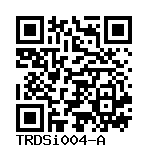TRDS-Cardio-012
TRDSi004-A
General
Cell Line |
|
| hPSCreg name | TRDSi004-A |
| Cite as: | TRDSi004-A (RRID:CVCL_VF07) |
| Alternative name(s) |
TRDS-Cardio-012
|
| Cell line type | Human induced pluripotent stem cell (hiPSC) |
| Similar lines |
STBCi110-A (SFC116-03-01) Donor's gene variants: CFH Donor diseases: type 2 diabetes mellitus age-related macular degeneration |
| Last update | 29th November 2021 |
| User feedback | |
Provider |
|
| Generator | Technion Research and Development Foundation (TRDS) |
External Databases |
|
| BioSamples | SAMEA104620787 |
| Cellosaurus | CVCL_VF07 |
| Wikidata | Q54973001 |
General Information |
|
| * Is the cell line readily obtainable for third parties? |
No |
Donor Information
General Donor Information |
|
| Sex | female |
Phenotype and Disease related information (Donor) |
|
| Diseases | A disease was diagnosed.
|
External Databases (Donor) |
|
| BioSamples | SAMEA104620788 |
Ethics
| Has informed consent been obtained from the donor of the embryo/tissue from which the pluripotent stem cells have been derived? | Yes |
| Was the consent voluntarily given? | Yes |
| Has the donor been informed that participation will not directly influence their personal treatment? | Yes |
| Can you provide us with a copy of the Donor Information Sheet provided to the donor? | Yes |
| Do you (Depositor/Provider) hold the original Donor Consent Form? | No |
| If you do not hold the Donor Consent Form, do you know who does? | No |
| Please indicate whether the data associated with the donated material has been pseudonymised or anonymised. | pseudonymised |
| Does consent explicitly allow the derivation of pluripotent stem cells? | Yes |
| * Does consent expressly prevent the derivation of pluripotent stem cells? | No |
| Does consent prevent CELLS DERIVED FROM THE DONATED BIOSAMPLE from being made available to researchers anywhere in the world? | No |
| How may genetic information associated with the cell line be accessed? | No information |
| Will the donor expect to receive financial benefit, beyond reasonable expenses, in return for donating the biosample? | No |
| Has a favourable opinion been obtained from a research ethics committee, or other ethics review panel, in relation to the Research Protocol including the consent provisions? | Yes |
| Name of accrediting authority involved? | The Helsinki Committee of the Rambam Health Care Campus, Haifa, Israel |
| Approval number | 0170-09-RMB |
| Has a favourable opinion been obtained from a research ethics committee, or other ethics review panel, in relation to the PROPOSED PROJECT, involving use of donated embryo/tissue or derived cells? | Yes |
| Name of accrediting authority involved? | The Helsinki Committee of the Rambam Health Care Campus, Haifa, Israel |
| Approval number | 0170-09-RMB |
| For generation of the cell line, who was the supplier of any recombined DNA vectors or commercial kits used? |
hIPSC Derivation
General |
|
| Source cell type |
A connective tissue cell which secretes an extracellular matrix rich in collagen and other macromolecules. Flattened and irregular in outline with branching processes; appear fusiform or spindle-shaped.; These cells may be vimentin-positive, fibronectin-positive, fsp1-positive, MMP-1-positive, collagen I-positive, collagen III-positive, and alpha-SMA-negative.
|
| Source cell type (free text) | from skin biopsy |
Reprogramming method |
|
| Vector type | Integrating |
| Vector | Virus (Retrovirus) |
| Is the used vector excisable? |
Unknown |
| Absence of reprogramming vector(s)? |
Unknown |
| Reprogramming vectors silenced? | |
Vector free reprogramming |
|
Other |
|
| Derived under xeno-free conditions |
Unknown |
| Derived under GMP? |
Unknown |
| Available as clinical grade? |
Unknown |
Culture Conditions
| Medium |
mTeSR™ 1
|
Characterisation
Analysis of Undifferentiated Cells
| Marker | Expressed | Immunostaining | RT-PCR | Flow Cytometry | Enzymatic Assay | Expression Profiles |
| POU5F1 (OCT-4) |
Yes |
|
|
|||
| TRA 1-60 |
Yes |
|
||||
| NANOG |
Yes |
|
|
|||
| SSEA-4 |
Yes |
|
||||
| Alkaline Phosphatase |
Yes |
|
|
Differentiation Potency
In vitro spontaneous differentiation
In vitro directed differentiation
Genotyping
Karyotyping (Cell Line) |
|
| Has the cell line karyotype been analysed? |
Yes
Normal
|
Other Genotyping (Cell Line) |
|


Login to share your feedback, experiences or results with the research community.